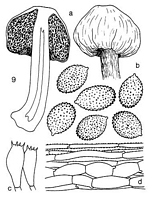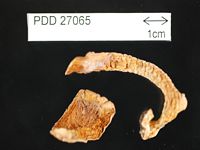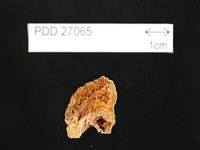|
 Cortinarius sarcinochrous Cortinarius sarcinochrous
SynonymsThaxterogaster carneolus
BiostatusPresent in region - Indigenous. Endemic
Images (click to enlarge)
Caption: Thaxterogaster carneolum Hk. sp.n. (type): a. fruitingbodies.
b. spores. c. basidia. d. cuticle. | 
Caption: Dried type specimen
Owner: Herb PDD | 
Caption: Dried type specimen
Owner: Herb PDD |
Article: Horak, E. (1973). Fungi Agaricini Novazelandiae I-V. Beihefte zur Nova Hedwigia 43: 200 p.
Description: Gastrocarp
35-55 x 30-40 mm, globose later becoming depressed globose with strongly enrolled
margin, dehiscent from upper part of the stipe at maturity, peridium 1-3 mm
thick, brownish to reddish brown, densely covered with small orange brown squamules
from the veil, dry, radially fibrillose. Gleba loculate, cells up to 3-4 mm
diam., elliptic, in aged carpophores deshiscent from stipe-columella, the exposed
gleba chambers covered with whitish fibrils of the veil, without conspicuous
trama plates, rust brown. Stipe 60-100 x 10-17 mm, cylindrical, robust, not
or only slightly attenuated towards the apex (columella), whitish, becoming
yellowish ochraceous, dry, longitudinally fibrillose, hollow, without significant
veil remnants. Context whitish. Odor and taste not distinctive. Chemical reactions
on peridium: KOH, NH3 or HCl - negative.
Spores
12-15 x 8.5-10 µm, broadly elliptic to ovate, mostly axially symmetric, covered
with minute warts, coarser towards the apex, ferruginous. Basidia 25-40 x 10-13
µm, 4-spored. Cystidia absent. Epicutis a cutis of cylindrical (4-8 µm diam.),
thin-walled, not gelatinised hyphae, strongly encrusted with brown pigment;
hyphae of subcutis 12-22 µm diam. Clamp connections present.
Habitat: ground amongst mosses under Nothofagus cliffortioides. New Zealand.
Notes: The
characters of this species are the robust carpophores, the loculate gleba and
the broad and ovate spores. Th. carneolum Hk. occurs together with Th.
epiphaeum Hk. in montane Nothofagus cliffortioides forests and it
may be difficult to distinguish the two taxa in the field.
|